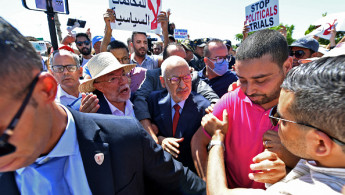Tunisia opposition chief faces anti-terror probe ahead of key vote
The leader of Tunisia's Islamist-inspired opposition party Ennahda arrived Tuesday for questioning by an investigating judge at an anti-terror centre, just days before a hotly contested constitutional referendum.
More than 20 security vans were stationed in front of the headquarters of the anti-terror centre where about 200 Ennahda activists were gathered in support of their leader Rached Ghannouchi, AFP correspondents said.
🔴وصول الشيخ راشد الغنوشي للقطب القضائي ..وتجمع أنصاره .... pic.twitter.com/KDRQgZ3Qr8
— علي بن غذاهم (@moradcha_king) July 19, 2022
Supporters chanted Ghannouchi's name as he entered the building, making a V-sign with their fingers for victory and waving placards.
"Stop political trials", one read, written in both English and Arabic.
Ghannouchi, 81, has been under investigation since June amid allegations of corruption and money laundering linked to transfers from abroad to the charity Namaa Tunisia, affiliated with Ennahda.
As part of the same investigation, Tunisian authorities last month arrested former prime minister and one-time Ennahda leader Hamadi Jebali for alleged money-laundering.
Jebali was later released, but is due to face questioning on the allegations on Wednesday.
Earlier this month, a court ordered the freezing of the bank accounts of Ghannouchi and a dozen members of his family and his party - including Jebali - as part of this investigation.
In June, Ghannouchi was also handed a ban from travelling abroad as part of a separate investigation into high-profile political assassinations that rocked the country in 2013.
Ennahda and Ghannouchi deny all charges against them.
.@AlessandraBajec on Tunisia's new constitution and how it sanctions Kais Saied’s drive toward one-man rule ⬇ https://t.co/qhXkuqR31q
— The New Arab (@The_NewArab) July 13, 2022
Tunisia's long-running political crisis took a dramatic turn last July when President Kais Saied sacked the government, froze the Ennahda-dominated parliament headed by Ghannouchi, and seized far-reaching powers.
Saied has put forward a draft constitution set for referendum on July 25, the anniversary of his power grab.
Opponents accuse him of waging political vendettas and dragging the country back to dictatorship, over a decade since its pro-democracy revolt sparked the Arab Spring uprisings.





 Follow the Middle East's top stories in English at The New Arab on Google News
Follow the Middle East's top stories in English at The New Arab on Google News
![Netanyahu furiously denounced the ICC [Getty]](/sites/default/files/styles/image_330x185/public/2024-11/GettyImages-2169352575.jpg?h=199d8c1f&itok=-vRiruf5)
![Both Hamas and the Palestinian Authority welcomed the ICC arrest warrants [Getty]](/sites/default/files/styles/image_330x185/public/2024-11/GettyImages-2178351173.jpg?h=199d8c1f&itok=TV858iVg)
